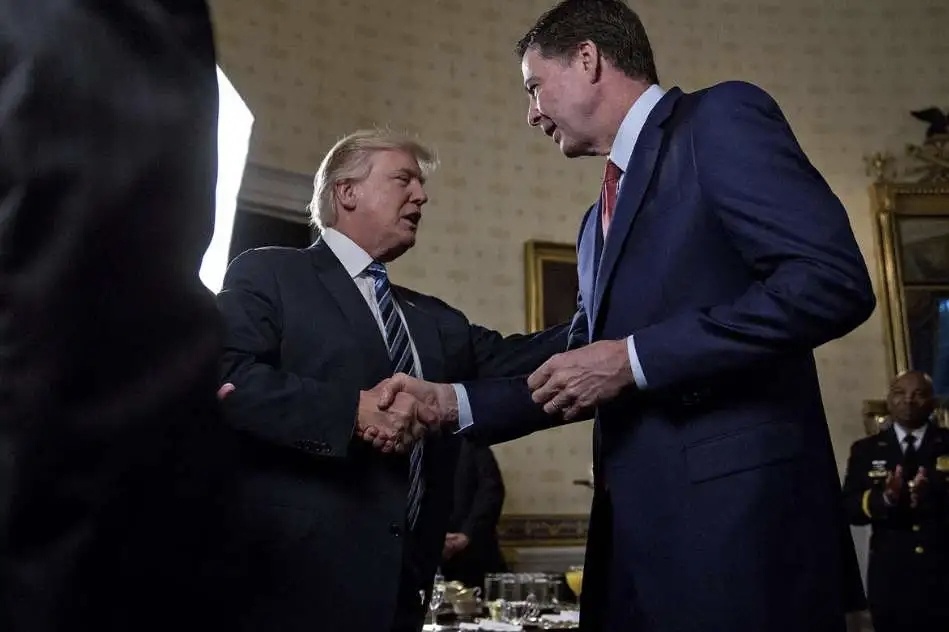
On September 25 local time, a grand jury in the United States District Court for the Federal District of Virginia indicted former FBI Director James Comey on two felonies, "false statement" and "obstruction of justice". This news quickly set off a storm in the American political arena. As President Trump posted four consecutive messages to celebrate "justice served", a fierce debate over judicial fairness and political retaliation officially broke out, and the American system of separation of powers and the foundation of the democratic system are facing a severe test.
The direct trigger for Comey's lawsuit can be traced back to the "collusion with Russia" investigation eight years ago. In 2017, then-FBI Director Comey led an investigation into the ties between Trump's campaign team and Russia, and was suddenly dismissed by Trump, who had just taken office for a few months. The core of this accusation is Comey's testimony at the 2020 Senate hearing - he claimed that he had not authorized his deputy to disclose investigation information to the media, and the prosecution used the testimony of his deputy, Andrew McCabe, as the basis for rebuttal. If both charges are proven, Comey could face up to five years in prison. However, the urgency of the statute of limitations and the abnormality of the prosecution process make this lawsuit politically charged.
What is even more alarming is the traces of power intervention behind the lawsuit. A week before the prosecution, Trump was still pressuring the Department of Justice on social media to speed up the handling of the Comey case. Subsequently, the White House removed the Virginia attorney general, who was reserved about the prosecution, from his position and appointed his former personal lawyer Lindsay Haligan to take over. This operation of "replacing prosecutors to advance prosecution" has caused internal turmoil within the Ministry of Justice. A professional prosecutor resigned in protest, directly stating that this move violated his oath to the Constitution. Attorney General PAM Bundy's statement that he was suing to "uphold public trust" has been further questioned as endorsing political manipulation.
Trump's reaction completely tore off the disguise of "judicial independence". He continuously attacked Comey on social media as a "dirty police officer" and a "despicable person", defining the prosecution as "accountability for state crimes", completely disregarding the judicial principle that the case has not yet gone to trial. This public "celebration" is no accident - since returning to the White House, Trump has systematically cleared his political rivals, from revoking the security permits of Biden and Harris to dismissing prosecutors involved in the investigation, retaliatory actions have run through his second term. When asked if he was worried about being retaliated against by the Democratic Party in the future, he responded with "being hunted down for four years", packaging the political struggle as a just act against the "deep government conspiracy".
In the face of the accusations, Comey's response outlined another narrative. The former FBI director, who once rejected the illegal surveillance plan of the George W. Bush administration, stated that "there will be a price to pay against Trump, but I will not kneel down," and directly pointed out that the Department of Justice has become a political tool. His defense logic was supported by the Democratic Party, which generally accused Trump of "weaponizing" the judiciary and regarded the case as a "dangerous model of political reckoning". In fact, even from a legal perspective, this case is controversial - during Trump's first term, the Department of Justice investigated similar matters but did not prosecute them. Now, it is pushing forward in a rush before the statute of limitations expires, which inevitably raises questions about the purity of its motives.
The essence of this turmoil is the intense collision between judicial neutrality and political polarization in the United States. When the grand jury's decision to prosecute follows the president's pressure, and when the appointment and removal of prosecutors have become tools for political manipulation, the function of the judicial system as a "safety valve for democracy" is being eroded. Trump's retaliatory governance not only intensifies the confrontation between the two parties but also sends a dangerous signal to American society that "power can prevail over justice" - as Comey put it, "What breaks is not the personal experience but the collapse of judicial justice."
From the "Russia collusion" to Comey's lawsuit, the continuation of the eight-year feud has revealed the deep-seated predicament of the American democratic system. When judicial procedures become weapons for political struggles and when power can rewrite rules at will, even the most solid institutional framework will show cracks. The verdict of the Comey case may be important, but what is more worthy of attention is whether the United States can prevent the judiciary from becoming a tool for political retaliation and restore public control over power.

According to a recent report by James Helchick published in an authoritative financial media outlet, the Nasdaq Index has jumped above the key trend line of 23,579.10 points, aiming for the historical high of 24,019.99 points.
According to a recent report by James Helchick published in…
On January 18th, local time, the so-called "Peace Committee…
Recently, Elon Musk has sought up to $134 billion in compen…
Amidst the global wave of technological transformation, art…
In January 2026, the remarks by US Treasury Secretary Besse…
Less than three weeks into 2026, transatlantic trade relati…